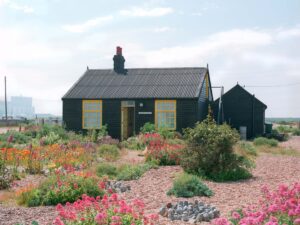What is it like to die? A question that unites us across age, gender, culture and time; death being one of the few certainties in life and one of the few “terra incognitas” remaining. But how often do we consider what death will mean for our bodies? This was the point of departure for UK artist duo Rebecca French and Andrew Mottershead’s new work Afterlife. Made up of four parts, the piece offers a series of intimate, poetic meditations on the process of the body’s decay, two of which can currently be found at Whitworth Art Gallery in Manchester.
Woodland (2016) and Grey Granular Fist (2017) are both site-based audio works that guide visitors on a deeply immersive journey through the imagined, yet scientifically accurate stages of their own bodily decomposition. Woodland is experienced lying on a warm blanket beneath a canopy of trees in Whitworth park; carrying the listener from the point of just beyond death through to their eventual fusion with the earth and fossilisation thousands of years later. Grey Granular Fist unfolds in one of three specially-designed “listening chairs” carefully positioned around the gallery, and courses the effect of the carefully controlled air conditions designed to protect and preserve the surrounding artworks within the collection. As the years go by, the body slowly dries out, finally becoming no more than a pile of dust – despite conservators’ efforts.
Paradoxically, each encounter feels strangely embodying. French and Mottershead’s practice draws upon a mix of video, performance, photography and sound to build tangible narratives around participants, who become active collaborators in generating the work. With Afterlife, language is the key ingredient. All four death scenarios (the other two follow a body decaying alone at home and out at sea) are rendered in highly visual, sensual terms that tap into the listener’s own archive of familiar bodily sensations and references; causing them to essentially “live through” what is being described. Though very graphic at times, Afterlife’s overall effect is deeply calming and uplifting; the stories all ending in a final sense of return and re-entry into the natural ecosystem.
As Mottershead explained: “The idea for the work originated from a combination of personal fear connected to the horror of dying and not being found, and simple curiosity.” Human decomposition is now largely alien to us in modern Western society. It is something that happens behind screens and in sanitised hospital morgues where the public health risk can be managed. Yet in the past, death was a part of life; the deceased often kept at home for a period of mourning before burial and prepared by family members. The artists collaborated with a team of forensic anthropologists, ecologists and conservators in developing each piece, and though being confronted with the minute details of decay is somewhat gruesome, it punctures our fear of the unknown.
At the heart of Afterlife’s power, however, is the invitation it offers to “step through the looking glass” and enter a place we will all arrive yet never actually know. It is “death-affirming” as Mottershead put it; ultimately celebrating our belonging to the wider fabric of the universe – something we often forget.
Sara Jaspan
Rebecca French and Andrew Mottershead: Afterlife runs until 25 March as part of SICK! Festival, Whitworth Art Gallery, Manchester. For more information, visit www.sickfestival.com
Credits:
1. Rebecca French and Andrew Mottershead, Afterlife, courtesy of Whitworth Art Gallery.





